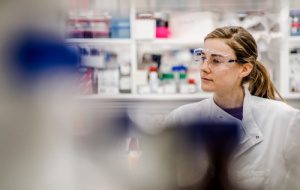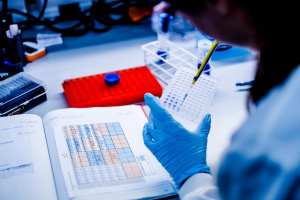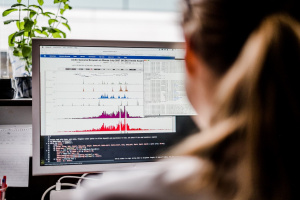Profile: Dr Marieke Oudelaar

Dr Marieke Oudelaar, Stevenson Junior Research Fellow in Biochemistry
Dr Marieke Oudelaar is the Stevenson Junior Research Fellow in Biochemistry at Univ. She finished her DPhil at Oxford in September 2018 and is part of the Higgs Group: Laboratory of Gene Regulation and the Hughes Group: Genome Biology.
How and why did you become an academic?
I have always been the curious type and enjoyed learning new things about the world around me. What attracted me to doing research in biology was that I wanted to contribute to our knowledge and understanding of life on earth. After my Bachelor’s, I chose a Master’s programme that allowed me to do various projects in different research areas, so that I could get a flavour of the different fields of biology. My favourite project was in the field of epigenetics and gene regulation. I, therefore, applied for a PhD programme in Genomic Medicine and Statistics in Oxford. During my PhD, I studied the structural organisation of the genome in the cell nucleus and how gene regulation takes place in this three-dimensional context. In my current role as a Junior Research Fellow at University College, I am building on the biological insights I gained during my doctoral research and applying the experimental techniques that I developed to address new questions on gene regulation.
 What does your day to day life as an academic look like?
What does your day to day life as an academic look like?
My days vary a lot, which I really enjoy. When I perform experiments, I spend most of my time at my bench in the lab. The kind of experiments I do generate large, complex data sets, so I also spend a lot of my time doing computational analyses and modelling my data. Increasingly, I spend a large part of my time writing articles and grant applications. I spend most of my time doing research, but in term time I also do some teaching and outreach.
 Give your specialist subject elevator pitch.
Give your specialist subject elevator pitch.
To me, one of the biggest mysteries of life is the process by which a single fertilised egg develops into a complex multicellular organism, such as a human being, with hundreds of different cell types. I am interested in what underlies these different cell identities. Given that all cell types of an organism share the same genetic code, their identities are determined by how they use this code and regulate the activity of their genes. In my research I try to understand how the genome is organised in the cell nucleus and how this determines how gene activity is regulated.
Do you have any advice for PhD students?
I think it is crucial to work on a topic that interests you, but equally important to work with a good supervisor in a supportive research group. Doing a PhD can be tough and it is so much easier with the right support.
 Have you faced any challenges pursuing academia?
Have you faced any challenges pursuing academia?
I feel like it is a privilege to work on something I care about a lot, but the pitfall is that it can be difficult to let go and relax in my free time. I think it is critical to find a good work-life balance to be productive in the long run.
How do you relax?
I like to go out for runs in the meadow and the woods. In the summer I enjoy touring on my bike through different parts of the world.
Describe Univ in three words.
Friendly, diverse, and inclusive.
You can follow Marieke on Twitter.
Published: 16 March 2020
